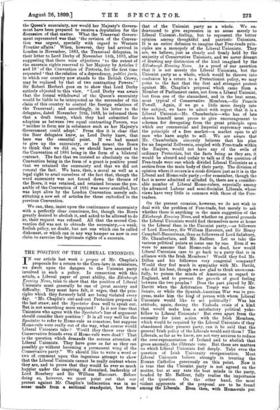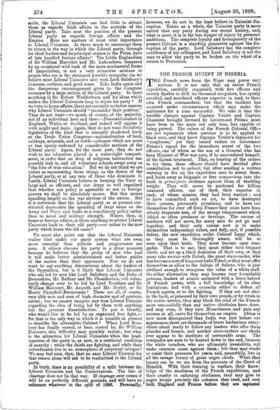THE POSITION OF THE LIBERAL UNIONISTS.
IN our article last week a propos of Mr. Chaplin's proposals for a return to the Corn-laws in miniature, we dwelt upon the dangers to the Unionist party involved in such a policy. In connection with this article, a Liberal paper of great ability, the Edinburgh. Evening News, tries to show that the position of Liberal Unionists must generally be one of great anxiety and difficulty. They must have felt, it urges, that the prin- ciples which they formerly held are being violated every day. " Mr. Chaplin's out-and-out Protection proposal is the last straw, and the Spectator does well to speak out. But is not something more required ? Is it not time that Unionists who agree with the Spectator's line of argument should consider their position ? It is all very well for the Spectator to refer to Home-rule as comatose, but suppose Home-rule were really out of the way, what course would Liberal Unionists take ? Would they throw over their Conservative friends even if Home-rule were dead ? That is the question which demands the serious attention of Liberal Unionists. They have gone as far as they can possibly go without becoming a permanent wing of the Conservative party." We should like to write a word or two of comment upon this ingenious attempt to show that the Liberal Unionists cannot be really content where they are, and to prove that they would be ever so much happier under the inspiring, if disunited, leadership of Lord Rosebery and Sir William Harcourt. Before doing so, however, we must point out that our protest against Mr. Chaplin's indiscretion was in no sense - made from a sectional standpoint, but from that of the Unionist party as a whole. We en- deavoured to give expression in no sense merely to Liberal Unionist . feeling, but to represent the better opinion among thoughtful and patriotic Unionists. It is an entire delusion to imagine that Free-trade prin- ciples are a monopoly of the Liberal Unionists. They are, we believe, just as clearly and firmly held by the majority of Conservative Unionists, and we never dreamt of drawing any distinction of the kind imagined by the Edinburgh Evening News. As a proof of our assertion that it is not merely the Liberal Unionists, but the Unionist party as a whole, which would be thrown into confusion by a return to a Protectionist policy, we may point to the fact that the first and strongest protest against Mr. Chaplin's prOposal which came from a Member of Parliament came, not from a Liberal Unionist, but from one of the staunchest, and in the best sense, most typical of Conservative Members,—Sir Francis Powell. Again, if we go a little more deeply into the subject, we have to admit with regret that it is a Liberal Unionist—Mr. Chamberlain—who has of late shown himself most prone to give encouragement to schemes for derogating from the great principle upon which our commercial and Imperial supremacy rests— the principle of a free market—a market open to all men who have aught to sell. We are aware that Mr. Chamberlain sincerely believes that his plan for an Imperial Zollverein, coupled with Free-trade within the Empire, would not have any of the evils of ordinary Protection, but the facts being as they are, it would be absurd and unfair to talk as if the question of Free-trade were one which divided Liberal Unionists as .a section from the main body of their party. The division of opinion where it occurs is a eras division just as it is in the Liberal and Home-rule party ;—for remember, though the fact is never admitted or alluded fo, there are a consider- able number of Liberal Home-rulers, especially among the advanced. Labour and semi-Socialist Liberals, whose views have very little in common with those of the Free- traders.
On the present occasion, however, we do not wish to deal with the problem of Free-trade, but merely to ask whether there is anything in the main suggestion of the Edinburgh. Evening News, and whether on general grounds the Liberal Unionists would find themselves more at home in the Liberal than in the Unionist party,—as followers of Lord Rosebery, Sir William Harcourt, and Sir Henry Campbell-Bannerman, than as followers of Lord Salisbury, Mr. Chamberlain, and Mr. Balfour. Let us take the various political points at issue one by one. Even if we were to assume that Home-rule is dead, how would Liberal Unionists care to go back to a party that is in alliance with the Irish Members ? Would they find Mr. Dillon and his followers very congenial company? Would they feel much in sympathy with Mr. Davitt, who did his best, though we are glad to think unsuccess- fully, to poison the minds of Americans in regard to England, and to prevent the growth of good feeling between the two peoples ? Does the part played by Mr. Davitt when the Arbitration Treaty was before the Senate, or while the Spanish-..kwerican War was in pro- gress, make him the kind of person with whom Liberal Unionists would like to act politically ? Was his attitude, again, during the Fashoda crisis of a kind that would make him a satisfactory political yoke- fellow to Liberal Unionists ? But even apart from the necessity for joint action with the Irish Members, which would be required by the Liberal Unionists if they abandoned their present party, can it be said that the general Irish policy of the Liberals would suit them ? The Liberals, as far as we know, are not very anxious to reduce the over-representation of Ireland and to abolish that gross anomaly, the illiterate vote. But these are matters on which Liberal Unionists feel deeply. Take even the question of Irish University reorganisation. Most Liberal Unionists believe strongly in treating the Roman Catholics generously on this point. Now it is true that the Unionist party is not agreed on the matter, but at any rate the best minds in the party, beaded by Mr. Balfour, fully realise the importance of the question. On the other band, the most violent opponents of the proposal are to be found among the Liberals. Even then, with Home-rule put aside, the Liberal Unionists can find little to attract them as regards Irish affairs in the attitude of the Liberal party. Take next the position of the present Liberal party as regards foreign affairs and the Empire. Here are matters of most vital importance to Liberal Unionists. Is there much to encourage them to return in the way in which the Liberal party, through its chief leaders and its principal organs in the Press, have of late handled foreign affairs ? The Little Englandism of Sir William Harcourt and Mr. Labouchere, tempered by an occasional wild rush of the more sentimental forms of Imperialism, is not a very attractive mixture to people who are in the strongest possible sympathy (as we believe most Liberal Unionists are) with Lord Salisbury's firmness, coolness, and good sense. Take India again and the dangerous encouragement given to the Congress nonsense by a large section of the Liberal party. Is there anything in Sir Robert Wedderburn and his ideas which makes the Liberal Unionists long to rejoin his party ? If we turn to home affairs, there are certainly no better reasons why Liberal Unionists should "reconsider their position." They do not want—we speak, of course, of the majority, not of an individual here and there—Disestablishment in England, Wales, or Scotland, and indeed will oppose it with might and main. Again, they do not want Socialistic legislation of the kind that is annually shadowed forth at the Trade Union Congress—nationalisation of land, railways, minerals, and so forth—schemes which are more or less openly endorsed by considerable sections of the Liberal party. Again, for the most part, they do not wish to see education placed in a water-tight compart- ment, in order that no drop of religious instruction can possibly leak in, and all voluntary schools swept away as "the foes of true education." But we do not think we are unfair as representing these things as the desire of the Liberal party, or at any rate of those who dominate it. Lastly. Liberal Unionists believe in keeping the Navy so large and so efficient, and our Army so well organised that whether our policy is agreeable or not to foreign powers we shall be absolutely secure. But this means spending largely on the war services of the nation. But it is notorious that the Liberal party as at present con- stituted deprecates the spending of large sums on the Army and Navy, and looks to a conciliatory policy rather than to naval and military strength. Where, then, in home or foreign affairs, is there anything to attract Liberal Unionists back to their old party,—or rather to the new party which bears the old name?
We must also point out that the Liberal Unionists realise that under our party system what are even more essential than policies and programmes are men. A citizen chooses his party in a great measure because he believes that the group of men who lead it will make better administrators and better guides of the nation than their opponents. Now we do not want to say anything discourteous about the leaders of the Opposition, but is it likely that Liberal Unionists who are led by men like Lord Salisbury and the Duke of Devonshire, Mr. Balfour and Mr. Chamberlain, will volun- tarily change over to be led by Lord Rosebery and Sir William Harcourt, Mr. Asquith and Mr. Morley, or Sir Henry Campbell-Bannerman ? These are all, of course, very able men and men of high character and of patriotic intent ; but we cannot imagine any true Liberal Unionist regarding the idea of being led by them with anything but the greatest dissatisfaction. To put it bluntly, who would like to be led by an organised free fight,— for that is the only way in which it is possible at present to describe the alternative Cabinet ? When Lord Rose- bery has finally ousted, or been ousted by, Sir William Harcourt., this difficulty may possibly vanish ; but what is the attraction for Liberal Unionists while the head- quarters of the party is, as now, in a continual condition of anarchy ; while the chiefs are fighting, and while their subordinates live in an atmosphere of perpetual intrigue? We may feel sure, then, that no sane Liberal Unionist for that reason alone will ask to be readmitted to the Liberal party.
In truth, there is no possibility of a split between the Liberal Unionists and the Conservatives. The line of cleavage does not lie that way. If cleavage ever comes it will be on perfectly different grounds, and will have no reference whatever to the split of 1886. Personally, however, we do not in the least believe in Unionist dis- ruption. Taken as a whole, the Unionist party is more united than any party during our recent history, and, what is more, it is in far less danger of injury by personal ambitions. The complete loyalty and homogeneity of the present Cabinet is a standing guarantee against the dis- ruption of the party. Lord Salisbury has the complete confidence of his colleagues, and Lord Salisbury is not the man to allow the party to be broken on the wheel of a return to Protection.



































 Previous page
Previous page